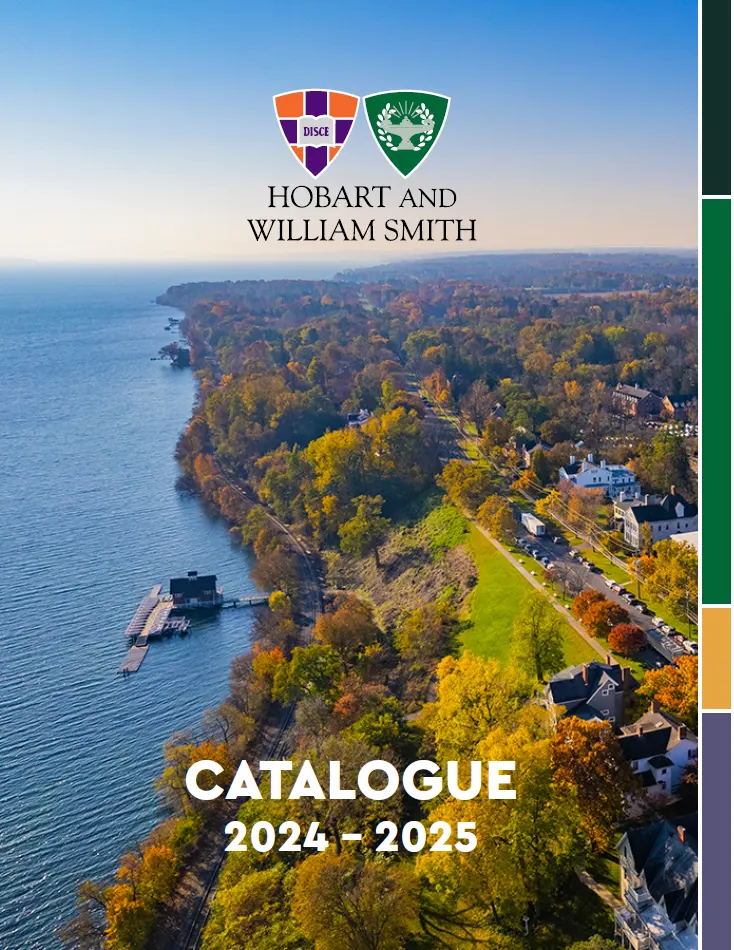Courses ofInstruction
Aquatic Science
Program Faculty
Walter Bowyer, Professor, Chemistry
Meghan Brown, Professor, Biology, Chair
Kristen Brubaker, Associate Professor, Environmental Studies
Lisa Cleckner, Director, Finger Lakes Institute and Environmental Studies
Tara Curtin, Associate Professor, Geoscience
Susan Cushman, Associate Professor, Biology
Ileana Dumitriu, Associate Professor, Physics
David Finkelstein, Associate Professor, Geoscience
John Halfman, Professor Emeritus, Environmental Studies
Aquatic Science is the interdisciplinary study of water at or near the earth’s surface. The interdisciplinary and science-based program is rigorous but essential for those students interested in the science behind water and water resources. The program selected the pertinent introductory and upper-level courses across the natural science division at the Colleges to provide an interdisciplinary, science-based view of water and to prepare students to enter the workforce at state and federal government laboratories, universities, industries, magazines, book publishers, television, radio, legal firms, and environmental societies, or continue in academia at the graduate level.
Why water and the Aquatic Science minor? The concentration of aquatic science faculty on campus and the resources to allow study of Seneca and neighboring Finger Lakes, including out 65-ft research vessel the William Scandling, provides a great resource for students planning careers in the field. This is a distinction at HWS not found at most other colleges and universities. Well trained students in the aquatic sciences will be of increasing demand in the future as the planet struggles with clean water, food scarcity, and the changing climate, just to name a few examples of water in international issues. The Aquatic Science minor provides an opportunity to major (or double major), in any of the sciences or other majors across the Colleges.
Offerings
Please refer to the Biology, Chemistry, Environmental Studies, Geoscience, Mathematics & Computer Science, and Physics departmental pages for course descriptions for their majors and minors.
Aquatic Science Minor
interdisciplinary, 7 courses
Requirements:
GEO 186 Introduction to Hydrogeology and BIOL 167 Introduction to Biology: Topics; and five courses selected from the following three lists: Global Context and Aquatic Processes, Spatial and Statistical Analysis, and the Aquatic Sciences Capstone Research Experience. A formal (non-credit bearing) summer or semester-long research or internship experience or approved internship can substitute for the capstone experience. Credit/No Credit cannot be used for program courses. No more than two courses from another institution may count toward the minor. All courses must be completed with a grade of C- or better. At east 3 courses must be unique to the minor.
Global Context and Aquatic Processes (Two Courses)
BIOL 225 Ecology (offered every semester)
BIOL 325 Invasion Biology (offered annually)
BIOL 240 Global Change Biology (offered alternate years)
BIOL 338 Aquatic Biology (offered annually)
BIOL 339 Global Change Biology (offered alternate years)
CHEM 260 Environmental Chemistry
GEO 210 Environmental Hydrology (offered each spring)
GEO 220 Geomorphology (Fall, offered alternate years)
GEO 250 Oceanography (Spring, semi-annually)
GEO 280 Environmental Geochemistry (offered each spring)
GEO 330 Limnology (offered each fall)
AUST 232 Marine Ecology of Australia (study abroad course)
Spatial and Quantitative Reasoning (Two Courses – only one statistics course may count)
ENV 203 Fundamentals of GIS (offered each fall)
ENV 281 Remote Sensing (offered each spring)
ENV 310 Advanced Geographic Information Systems
BIOL 230 Biostatistics (offered every semester)
GEO/ENV 207 Statistics (offered annually)
Capstone Research Experience (One Course and Formal Presentation)
AQSC 450 Independent Study
AQSC 495/496 Honors

